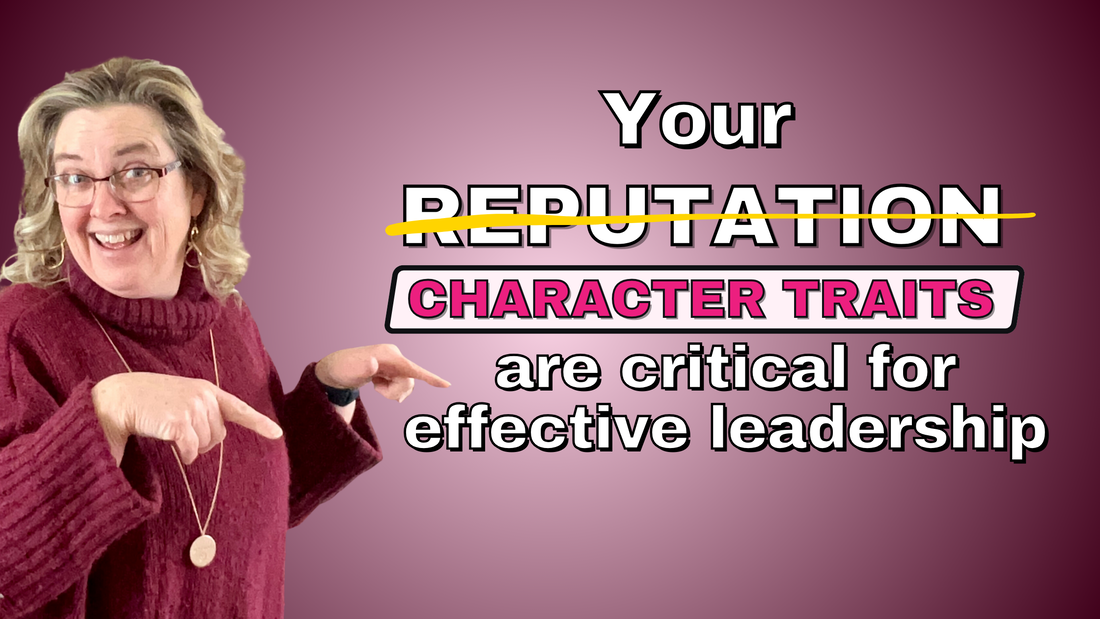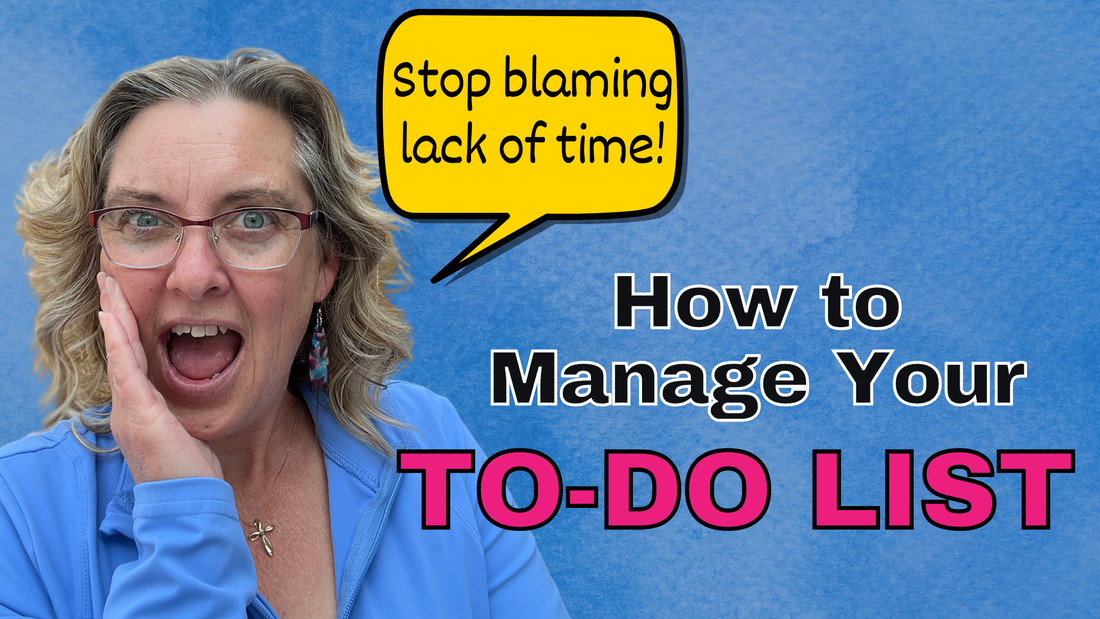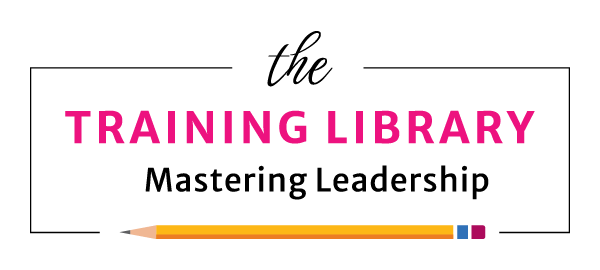Nonprofit Leaders Can Make Time for Personal & Professional DevelopmentEffective leaders need and want to grow themselves
As a woman leading in a non profit, I know you want to learn. You want to grow and develop yourself.
Leadership is synonymous with personal development
The best leaders know that they must grow, develop, change and adapt to what is going on. Strong leaders work to become their best selves, cultivate strong character and continue that always. To do that, you need time to work on yourself.
But we all know you're going from meeting to meeting to meeting. Between those meetings, you respond to texts and emails while you put out fires, deal with crises or tick off the boxes of things that absolutely need to be done. And that doesn't cover what happens when you get home! The most effective leaders create time for weekly personal and professional development
When would you find time to do this? How on Earth would you fit it into your busy day, either at work or at home?
It's true. To be your best self, you need to spend time learning, growing and developing. You need to discover new skills, learn new information and do the inner work to figure out how to assimilate that into your leadership and life. So, how do you find time to work on yourself? Below are three things you need to consider to help you shift your mindset and your time, so you can make time to grow yourself as a nonprofit leader. 3 Shifts to Help Nonprofit Leaders Make Time for Personal and Professional Development TrainingShift # 1 - Mindset Matters
Your mindset matters a lot! You need to think, believe, have an expectation, and understand that growth and development are not nice to haves but must-haves. You must also believe that you can grow.
Shift # 2 - Connect Your Learning to a Goal
Adopting a mindset that personal growth and development are part of leadership and creating the space to do that work is most effective when connected to your goals. As a leader, you need more than goals that your organization may or may not have set for you. You need your own goals that you have crafted to help you be your best self. The best leaders create the impact you desire at work and in your life.
In The Training Library, I encourage you toreview where you're at annually. From there, you create goals that you want to work on and draft a personalized learning curriculum. This learning curriculum will identify how and from what sources you will learn those things you need to learn or work on. From there, my students in The Training Library schedule time each quarter to see how they do on those goals. Then, monthly, weekly and daily, I encourage them to connect those goals to their daily activities. Creating this strategy and curriculum to work on yourself encourages you to create time to do it. It's not something random; it's a plan you are working on, and you can see the steps and feel the outcome. You need to create goals and a learning curriculum Shift # 3 - You can't find time, you must create time
You will never FIND time. You need to CREATE time. We spend most of our leadership and life reacting to things, and instead of reacting, we need to create our own experience of leadership. Part of this experience of leadership that you desire, if you've read this far, is the desire to grow and develop yourself. To do that, you need to create the time and space to grow and develop yourself.
We all have the same 24 hours in a day. What we choose to do with those 24 hours makes the difference for each of us. You have to prioritize in some tiny way growth and development. The time doesn't have to be perfect
We often think it has to be the perfect time with the right pretty journal and candle lit beside us. Nope.
It doesn't have to be a big chunk of time
You don't need a full hour to do personal development work. A few minutes here or there will keep you moving forward. Certainly, you'll want more substantial chunks of time to do some of the work. But you can also do parts of it in smaller segments.
You may need to be creative
This goes back to the perfect time idea. We often have a vision of what reading or journaling looks like. Don't think it has to be that way.
3 places to create time to do the inner work of leadership1) Make use of existing downtime
The best example is all of the times in your life when you are waiting! For example:
2) Look at current time wasters/time fillers
Consider changing what you do during some of these times:
3) Carve out time
Make time for 15 minutes of learning 4 times a week in these spots (That's a whole hour eacweek!!)
Tada....YOU just CREATED a whole hour each week to work on developing yourself! WHOOOOO HOOOOO!!!! Remember, personal and professional development is your path to success in leadership and life! Do this right now to make time to grow yourself as a nonprofit leader
If you've been meaning to
NOW is the time to plan HOW you will do that growth. If you need a place to start,The Training Library may be a good resource for you.
0 Comments
How to repair your reputation Angela told me she and one of her supervisors are not getting along. "I don't feel like she respects, appreciates, or likes me or my leadership style. She questions my decisions and actions and undercuts my authority." What's more, Angela described how the tension falls over to the rest of the team, and everyone can feel its effects. Angela acknowledges that she's done an incredible amount of personal growth over the past few years. In the past, she wasn't always emotionally and physically available to her team. She was short with them, frazzled at times and made too many reactionary decisions. Now that she's changing, she needs also to change her relationship with her team and their perception of her. Angela said, "My reputation sucks. How do I clean that up?" As Angela was telling me her story, I totally understood her pain. I've been there. I damaged my reputation, and I repaired it. My team lost trust in me In 2008, things took a turn. While my team had been able to trust me, the arrival of a large new contract changed that. Previously, I'd managed everything on my plate and did it with a level of confidence. But increased responsibility, travel, staffing, scope and budget all left me scrambling to hold things together. Because of that:
That year's feedback on my performance appraisal indicated what the staff thought of me. They said that I lacked integrity. I was frustrated, hurt and discouraged by the feedback. Previous performance appraisals indicated I had strong trust with the team. How could things have plummeted so fast? Without trust, my team was falling apart! When my team lost trust in me and felt I was out of integrity, they didn't feel they had a strong leader. Therefore, as trust in our team eroded, I lost followers. The team cohesiveness was quickly eroding, and in its place was tension, bickering, and whispering that stopped when I walked into the room. The decline culminated in a grievance filed against me. I was left fearful of being fired and, at the same time, ready to quit. Embracing my essence: I took a good, long, hard look at where I was at In working with my coach, I realized I lacked integrity, not just because people said I did, but because, through careful self-reflection, I saw it with my own heart.
I wasn't walking my talk. I wasn't leading with integrity; it was time to change that. I noticed what parts of how I was leading needed to change.
Pondering my potential: I looked at who I wanted to become I knew I wanted to repair my reputation. I wanted to be not just the leader I was but an even better version of myself. By pondering our potential, we set new intentions for who we are becoming.
Engaging in continuous learning: I did the work to become who I wanted to be To rebuild my reputation, I needed to do the ongoing work of building my character. Character in leadership refers to the set of moral and ethical qualities, values, and principles that guide your behaviour and decision-making. Your character is about your integrity, how accountable you are for your actions and decisions, and how respectful you are. You will be judged as leading with strong character if you demonstrate empathy, courage, humility, authenticity and consistency. I decided that I wanted to lead in a way that demonstrated my highest moral and ethical standards, set a strong example and inspired trust, loyalty, and respect among my team. To do all of that, I had to work on my conduct. People define your character by your conduct. It's your interaction with them that impacts what they think of you. But what they think about you is not the endpoint. Their opinion of you is only the catalyst for their behaviour. Your actions, your conduct, and, in essence, your character at any given moment will influence others to take positive action or negative action. I'm not suggesting we need to be chipper all of the time. However, the sum of your actions and behaviour over time creates how others define your character. The problem is how you conduct yourself in stressful times tends to outweigh other people's memory of your conduct during smoother times. Therefore, we must be even more diligent about our behaviour during crises. That was the work I needed to do!
And none of this stopped and still hasn't. I'm constantly growing, learning and evolving, each day working to be a better and better version of myself. 3 steps to develop your character and improve your reputation It was the above steps that I told Angela about:
Resources to help Assess Yourself:
Grow yourself
Cultivating your character takes time Character development is not easy work. Developing your character takes time and attention. It requires you to be vulnerable and explore some of your life's messy and painful places. Not just once but again and again. Be intentional about developing and cultivating your character. That way, you can let go of who you think you should be and just be you. You'll be happier and a better leader! Next week, we will discuss how to make time to do this inner work of leadership development and cultivating your strength of character. ✏️ Join the monthly membership and: BECOME confident in your leadership abilities BOUNCE BACK when adversity hits BE your best self Find a place to BELONG! ✏️ When you join The Training Library membership, you'll become confident in your leadership abilities, learn to bounce back when adversity hits, discover how to be your best self and find a place to belong! Do you often wonder what you must DO to be a better leader?
While those are important components of leadership, the critical question is deeper than that. It's not what you have to DO to be a good leader; the question is: Who do you need to BE to be a good leader? Be? Yes, BE! Who do you need to BE to be a good leader? Consider the HOW of what you DO Take a moment to consider who are you BEING when you do your job?
Have you ever considered your character? Who you are BEING when you do your job is a description of your character. It's the essence of who you are. But we don't talk about it. 🤔 When did your manager last talk with you about developing your character? 🤷🏼♀️ When did you last consider why it might be important to develop your character? 🤨 Have you ever wondered how to build your character? For most of us, the answer is never! It may be time to consider it. How you are BEING is a description of your character Your character is your unique combination of who you are:
Feeling like the imposter? When we don't feel like ourselves while leading, we assume that's how it should be or that perhaps we aren't leading correctly. But when we are out of touch with our true selves, we feel awkward, fake, or like we are messing up. There is this enormous gap between who we believe we should be and who we actually are. That leaves us unsure of where to turn and not really satisfied. When you develop your character, you'll be happier! You will feel better, more fulfilled, and positively influence those around you if you take the time to cultivate your character. Instead of stepping into the role and trying to lead how you should lead when you develop your character, you will learn to lead from your character strengths. 🎭 Rather than feeling like you're putting on a persona or mask for each encounter and interaction, you will feel more authentic and more productive and impactful. Why don't we lead with our character strengths? Most of us are genuinely unaware of our true selves. We've lost sight of our true selves as we transitioned through our teen years, started families, and advanced in our careers. Many of us don't know what makes us tick because, quite frankly, we don't know what our best gifts and talents are. And we have no idea how to use them to lead. We've never tried to find, unearth, or awaken them. 🤨 Who are you? Back to describing character Once again, consider how we describe other people and how others might describe you. Pay attention to the word character in each of these sentences👇🏻 🟪 Often, we talk about someone's character in GENERAL statements such as,
🟪 Now, think about SPECIFIC POSITIVE descriptions of other people's character traits. Consider again how people might describe your traits. These are some ways we speak in awe of certain women's characteristics:
🟪 Don't forget that not all character traits are good. Here are some SPECIFIC NEGATIVE traits Reflect on this list below. These are times we cringe at character traits that some women exude:
I hope you are now seeing how important it is to cultivate and develop your character. How your character is defined: A little overview: Your character is your unique combination of traits distinguishing you from others. It is how others perceive you, not how you describe yourself. Let me say that again. Your character is someone else's perspective of you. It's not how you see yourself and wish others would see you. You certainly can impact or influence what others think about you, and you should. Ultimately, how people describe your character is their perception, which makes character development tricky. Perhaps you wonder if character development is about getting people to like you. 🙅🏼♀️ No, that's not quite it. Your job as a leader is to guide people to a vision 👀 by inspiring them to grow 🌱 and helping them develop 🧩 so that together, you can reach your shared vision 🙌🏻 Your influence and impact on people can motivate them to be their best selves, which is incredibly helpful to reach team and organizational goals and serve clients. Achieving that level of impact on others may be easier if they like you. But still, it's less about people liking you and more about them respecting you. Why you should care about how people define your character ⭐️Your character is so important because it influences what people think about you and, therefore, its impact on them. When your character is strong, you have a good reputation. It's that reputation that garners others' respect. Someone doesn't have to like you to respect you. The two do not always go hand in hand. However, when people on your team respect you, it allows them to be patient with you, persist for you, and push themselves. They'll often respect you because they believe in you, your message, and how you live that purpose, which is inextricably linked with your character. As such, they will conduct themselves in a certain way because you've inspired them, and they are motivated by your actions, your conduct and the type of person you are. 💡 How to lead with strong character 1️⃣ The first step Start by noticing character, yours and others. Keep a log, note on your phone or journal entry about character words you'd use to describe your or another's character. 2️⃣ The next step Then, choose your character traits. Pick words that you'd like others to use to describe you. What is the type of leader you want to BE? 3️⃣ Finally Finally, cultivate your character Do the work to grow and develop those character traits in yourself. Next week, I'll introduce you to the strategies for developing your desired character traits and how to become the leader you want to be, having the impact you desire to have. Learn to Develop Your Character If you want to learn more about developing your character and you are a member of The Training Library, check out the WEBINAR: Develop Your Strength of Character.
If you are like most leaders, you've been here: You have a precious break in the day, so you look at your endless to-do list. All tasks seem important, but you scan the list, looking for the priority items you can knock off in a few minutes. As you glance at each item, you make a mental note:
Your to-do list is like an emotional roller coaster In the time it takes to scan down the list, your emotions move from overwhelmed to anxious, then annoyed and doubtful, ending with discouraged. Pushing the to-do list aside, you begin scrolling through your inbox without realizing you've avoided doing anything on the list and, as a result, get further behind and more disheartened 😩 I get it. I've been there many, many times too! In fact, if you are like most leaders, you have a lengthy to-do list that haunts you into the wee hours of the morning and, honestly, will never get done. But why is it that we will never get through our to-do list? 💥The reason your to-do list will never get done is twofold REASON # 1 First, it's a disorganized list that is more of a holding place than a completion place.
REASON # 2 Second, we look at the list as items that need time to be completed, and we blame lack of time as the enemy 😡 ⏰ It's way more complicated than just not enough time. For example, look at your to-do list and consider:
Without taking all of that into consideration, our to-do list becomes an impossible challenge, and time becomes the enemy. But time is getting a bad rap. ❌ It's not ⏳ time's fault. The time available to complete tasks is only one small factor in managing our to-do list. There are other things to consider. Below are three steps to help you manage your to-do list with much greater success👇🏻 QUESTION: How do I get done, what matters on my to-do list? ANSWER: You create order and awareness. 1) First, start by prioritizing your to-do list into some semblance of order That way, your to-do list can become a tool working for you instead of a threat against you. 2) Next, let go of inappropriate expectations of your to-do list You change expectations of your to-do list by shifting your mindset from believing your to-do list is a list of things that need doing to a holding place for projects and tasks.
3) Finally, move a few key items to each day's agenda, plan or priorities When you only have three things to get done each day, you will check them off with greater speed and satisfaction.
But we are still overlooking something That covers the tactical side of getting through your to-do list. But there is something bigger that needs addressing. 🐘 The elephant in the room is the emotions you felt when you scanned the list.
Your emotions play a big role in productivity Many of us are unaware of our feelings, let alone how our emotions affect our productivity. We can choose our responses better by slowing down and getting a better awareness of what we are experiencing and how our emotions distract us from getting done what matters most. If you want more help with this, read this next: Why Your Emotions Are Sabotaging Your Productivity If you've been meaning to
NOW is the time to plan HOW you will do that 👆🏻 growth.
|

Available on Amazon
Archives
May 2024
|
|
Leadership TRAINING for Nonprofit Leaders
Become a confident and competent nonprofit Leader: Join The Training Library membership Executive and Leadership COACHING Leadership Coaching for Nonprofit Executives, Leaders and ManagerCoaching |
PODCAST for Nonprofit Leaders
The Surviving to Thriving podcast: Strategies, systems and support to lead your nonprofit with confidence FREE RESOURCES to Grow your Leadership Skills Free Leadership Training Resources, Worksheets and Templates |
Become a CONFIDENT LEADER
|










 RSS Feed
RSS Feed
